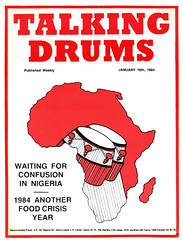Does Nigeria Have the Freest Press? - Time Will Tell
Ben Mensah
Since freedom of the press does not exist in a vacuum but definitely with the support of the civilian politicians the question to ask is whether the journalists would persist in their boldness and independence under the military too.The judiciary in Nigeria support the government of the day and dispense justice to any law which it enacts without any impartiality.
This categorical stand of the judiciary was made explicit by the Chief Justice of the Federation, Justice George Sodeinde Sawemimo, four days after the overthrow of Alhaji Shagari's civilian administration.
Two new Appeal Court judges whose swearing-in ceremony was the occasion for the pledging of support by the judiciary for the new military government of General Mahammadu Buhari in turn promised to uphold the country's constitution as amended by the Federal Military government without fear or favour.
The Nigerian Labour Congress has said in a statement on 3rd January, that having studied Maj-Gen Buhari's 'maiden speech' there existed 'a correspondence of views and concern' over the problems which led to the military intervention.
The National Association of Nigerian students (NANS) has agreed to do business with the new military regime. In a statement the association called on the government to immediately pay the arrears of workers' salaries, stop attempts to increase the cost of education, abrogate the public order act, ensure press freedom and called for a 'more dynamic and progressive stand' on international issues.
At least one lawmaker in the Shagari era, Chief Francis Nzeribe, a Senator has welcomed the coup while a number of pressure groups have also recognised the change in government and are making demands on the military for sweeping reforms.
On the basis of the reaction of the above listed sectors of the Nigerian society to the coup, where, one may wonder, is the justification for anyone to impugn the integrity of others, especially non-Nigerians who try to analyse the coup and seek to assign reasons for it.
Even those foreign analysts who have readily adopted the new military regime and are saying that the change was expected and overdue can be pardoned on account of the singular reaction to the coup by the Nigerian judiciary which is supposed to be the custodian of the suspended constitution.
The chemistry of Nigeria's present situation and indeed of any others in an African country has been simplified by unattached analysts to suit the whims and caprices of the countries they represent. Their analysis therefore tend to dwell on how many of their fellow citizens are trapped or safe after the coup, how much investment they have in the coup country, and whether the new rulers will honour their obligations to the international community, including the payment of loans contracted by the ousted regime. It is enough for such commentators on African affairs to use a different yard- stick from what they apply to review events in their home countries.
Their concern is never with the legitimacy of the regime they want to deal with. To them it is only the end that justifies the means. Democracy, peace, freedom of the individual and of speech and legality therefore have no defenders in Africa.
But this writer having witnessed spontaneous and voluntary demonstrations on one hand and forced and manipulated ones on the other, for several military coups would not rush to gauge, based on demonstrations of support, the popularity and indeed the justification for the overthrow of an elected civilian government.
In other countries when the judiciary journalists. had been faced with similar circumstances, caution bordering on silence was the watchword of the judges. In Nigeria however the Federal Chief Justice has not only tacitly sanctioned the acquiescence of the judiciary to the military takeover but has indeed too. committed their loyalty to the government of the day.
Why then should foreign analysts be expected to despatch researchers to carry out opinion polls based on confidential interviews with a cross section of the population before they arrive at conclusions on whether an African government is popular or not.
To them, despite the emergence of skyscrapers, universities, fly-overs etc. which criss-cross Africa, the dark continent of the nineteenth century remains the jungle of the twentieth century.
And what would one say to the attitude of the Nigerian media which even though considers the coup as an aberration has generally welcomed it.
The media in Nigeria has been considered as the freest and their journalists, the boldest among African journalists.
Since this freedom did not exist in vacuum but definitely with the connivance of the civilian politicians the question to ask is whether the journalists would persist in their boldness and independence under the military
Already signals have been flashed to them. The new Head of State, Maj Gen. Buhari describing one newspaper report on the circumstances surrounding the death of Brigadier Ibrahim Bako, the sole victim of the coup, as an unfair report, appealed to Nigerian journalists for co-operation and promised, 'we cannot stop you from reporting facts but you will show a sign of maturity and avoid over sensationalism.'
It is yet too early to judge how the media is playing ball with the military rulers they have welcomed. Only time will tell whether Nigeria still has the freest press in Africa and boldest journalists among African journalists.
